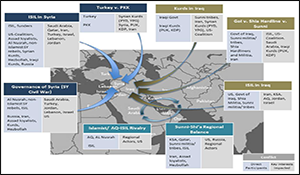
Part I: Characterizing the Iraqi-Syrian Conflict System
Unpacking the Regional Conflict System surrounding Iraq and Syria—Part I: Characterizing the System. Author | Editor: Astorino-Coutois, A. (NSI, Inc). This is Part I of a larger study exploring the dynamics of the central Middle East conflict system. It describes the system and why it is critical to assess U.S. security interests and activities in […]
Continue Reading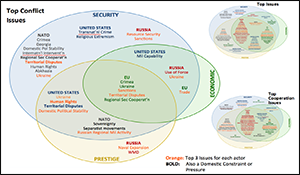
Conflict and Convergence in Eurasia (ExecSum)
Drivers of Conflict and Convergence in Eurasia in the Next 5-25 Years — Integration Report: Executive Summary. Author | Editor: Bragg, B. (NSI, Inc). This project identified threats and opportunities in Eurasia (with particular emphasis on USEUCOM area of responsibility (AOR) countries). This report provides an overview of the regional issues identified by the US, […]
Continue Reading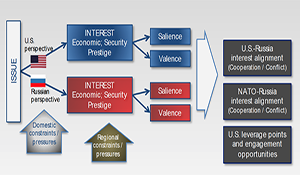
Conflict and Convergence in Eurasia (Integration)
Drivers of Conflict and Convergence in Eurasia in the Next 5-25 Years — Integration Report. Author | Editor: Bragg, B. (NSI, Inc). Evaluating strategic risk in the Eurasia region over the next two to three decades is a complex challenge that is vital for USEUCOM planning and mission success. The depth of our understanding of […]
Continue Reading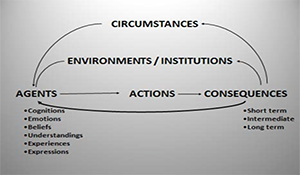
Bio-Psycho-Social of Violence and Terrorism
Assessing and Anticipating Threats to US Security Interests: A Bio-Psycho-Social Science Approach for Understanding the Emergence of and Mitigating Violence and Terrorism. Author | Editor: Giordano, J. (Georgetown University Medical Center). This white paper represents the work of intra- and extramural subject matter experts (SMEs) from multiple disciplines, convened to provide views and insights to […]
Continue ReadingViTTa Analysis of Eurasia in the Next 5-25 Years
Research to Identify Drivers of Conflict and Convergence in Eurasia in the Next 5-25 Years: Virtual Think Tank (ViTTa) Summary Report. Author | Editor: Canna, S., Bragg, B., Desjardins, A., Popp, G. & Yager, M. (NSI, Inc). From July through November 2015, NSI employed its Virtual Think Tank (ViTTa) methodology to systematically interview 26 subject […]
Continue Reading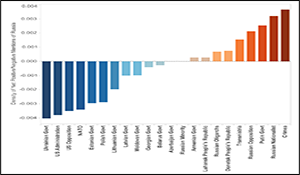
Thematic Analysis of Russian and NATO Speeches
Identification of Security Issues and their Importance to Russia, Its Near-abroad and NATO Allies: A Thematic Analysis of Leadership Speeches. Author | Editor: Kuznar, L. & Yager, M. (NSI, Inc). This study addresses key questions posed in the SMA EUCOM project by using thematic analysis of speeches from leaders of state and non-state polities in […]
Continue Reading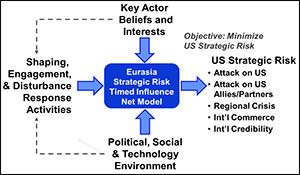
Eurasia Strategic Risk and Future Trends
Eurasia Strategic Risk. Author | Editor: Elder, R. & Levis, A. (GMU). The GMU Eurasia Strategic Risk project examined future political, security, societal and economic trends as they apply to the decision calculus of key Eurasian regional actors. Timed Influence Net (TIN) models were used to identify potential sources of strategic risk for the United […]
Continue Reading
Pronouncements For Defeating ISIS
Pronouncements For Defeating ISIS Dangerously Play Into Grand Strategy. Dr. Lawrence A. Kuznar is professor of anthropology at IPFW and has advised the US Department of Defense on global terrorism. He wrote this for The Journal Gazette on November 25, 2015. I have been part of a team of academic and government researchers who, for […]
Continue Reading
Response To POTUS Executive Order
Executive Order — Using Behavioral Science Insights to Better Serve the American People. Where Federal policies have been designed to reflect behavioral science insights, they have substantially improved outcomes for the individuals, families, communities, and businesses those policies serve – President Barack Obama, 2015 By Robert Popp On September 15, 2015 President Barack Obama released […]
Continue Reading